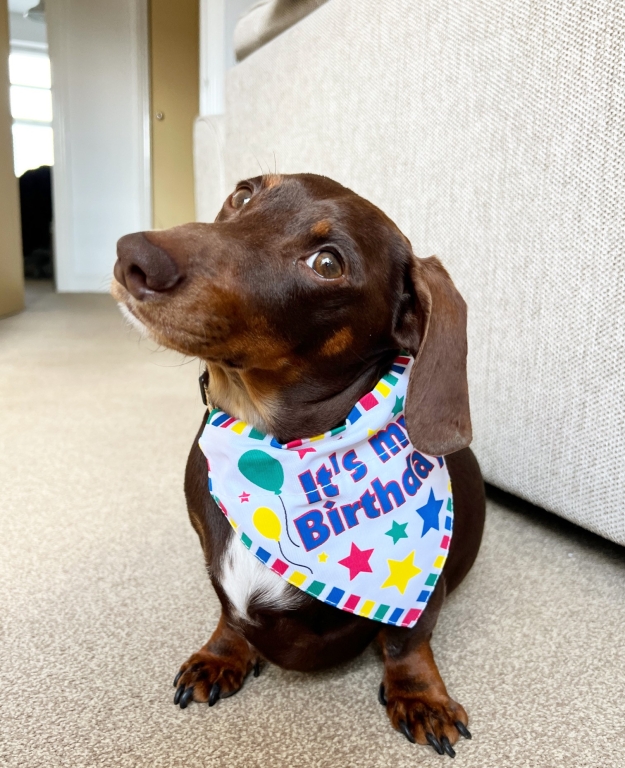
Vets ‘switched off’ the rapid destruction of red blood cells in Mylo's overreactive immune system
Beloved Dog Cured Of Life-threatening Autoimmune Disease By Lumbry Park Specialists
A much-loved family dog has been cured of a life-threatening disease of the immune system by a team of vets at Lumbry Park Veterinary Specialists.
Mylo, the one-year-old old Dachshund, became weak, lethargic and lacking appetite over several days, to the point where he did not want to get up or go out for walk.
Owners James and George, who live in Ipswich, quickly took Mylo to their local vets practice, where they were told that Mylo was critically ill and that the prognosis was poor.
It was recommended that Mylo be taken to Lumbry Park veterinary hospital in Alton, Hampshire, so that its team of specialist internal medicine vets could see if they could identify the problem and treat his condition effectively.
When Mylo arrived, Lumbry Park’s team immediately conducted several blood tests and imaging of his chest and abdomen to see if they could identify what the issue was. They established that he was suffering from a very aggressive form of immune-mediated haemolytic anaemia. Here, red blood cells in Mylo’s body were being rapidly destroyed by his overactive immune system, and this was also happening very quickly within his blood vessels - reflecting a more aggressive form of the autoimmune disease.
Mylo’s life-threatening condition required urgent action. To save him, the vet team started a programme of intensive treatments to control then stop his immune system breaking down the red blood cells.
Mylo received a carefully balanced course of new medical treatments to counteract his overactive immune system. He also underwent a course of six blood transfusions to stabilise his body until the medication started to work well. In addition, the vets battled to rectify severe complications associated with his condition - including extreme jaundice, pneumonia and blood clots elsewhere in his body.
It took the team 16 long days to get Mylo stable. Only then was it safe for Mylo to be discharged home.
Miraculously, only a couple of weeks after the treatment, little Mylo became his old bright and active self again. Now, over one year on, his owners James and George says no one would ever know how poorly he’d been.
Pieter Defauw, Head of Internal Medicine at Lumbry Park, said: “When Mylo came to us we were very concerned. Whilst immune-mediated anaemia is relatively common, Mylo was very severely affected. Without intense treatment he would not have survived. Even despite being so critically ill, Mylo has always shown a great personality during his stay with us in the hospital. Everyone loved taking care of him. We’ve regularly kept in touch with Mylo’s owners to monitor his condition - and are so happy to see him now enjoying life to the fullest.”
James, and George said: “To compare where we are now to where we were a year ago is unrecognisable. Thankfully Mylo is now very much himself - a fun, cheeky chap living life to the max, very much spoilt, and who gets away with murder! On this anniversary, we just wanted to reach out and say thank you again to Pieter and the Lumbry Park team for helping keep Mylo in everyone's lives.”
Founded in 2015, Lumbry Park Veterinary Specialists is one of the largest and most advanced veterinary specialist referral centres in the UK. With state-of-the-art facilities and employing some of the UK’s leading veterinary specialists, The Lumbry Park offers a wide range of veterinary services including anaesthesia and analgesia, cardiology, critical care, dermatology, imaging, internal medicine, neurology, oncology, ophthalmology, orthopaedics, physiotherapy and soft tissue surgery. For more information visit: www. lumbrypark.co.uk.
More from CVS UK Ltd
- Paralysed dog walks again after large tumour removed from spine
- Lumbry Park referrals recruits new Hospital Director
- World-wide study reveals new clinical insights into feline hypoadrenocorticism
- CVS upskills RVNs to undertake diagnostic imaging in practice
- New research evaluates use of 3D-printed guide for treatment of distal tibial varus deformity

 4 months ago
4 months ago  453 views
453 views

 2 weeks ago
2 weeks ago